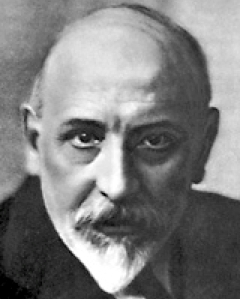Season 5
from april 29th to may 1st, 2011
at 2pm and at 4pm
at the International Antiquarian Book Fair
at the Grand Auditorium of the Grand Palais, Paris
 © Opale
© Opale Luigi PIRANDELLO
Nobel Prize 1934
« for his bold and ingenious revival of dramatic and scenic art. »
Luigi Pirandello was born in the south of Sicily in a suburb of Agrigente named Chaos. His forefathers, rich patrons of a sulphur mine in the region, had just lived through the adventure of Italian unification. The birth of Pirandello was part of the period of the aftermath of the revolution; the exuberance fostered by Garibaldi disappeared and was replaced by discouragement and disillusion.
Pirandello should have followed the path of his father and managed the sulphur mine by his side: sign of the end of the revolutionary adventure. This is not what happened however - there was a twist. A character that would play an important role in the life of the child was his servant, an extraordinary storyteller who told him fables and legends of his country. Words instantly attracted him and pushed him towards the world of novels and poetry. In 1880, settled with his fmaily in Palermo, he wrote his first poems: the early mutterings of a creature destined to be a writer.
However, the distance from his father increased and became an irreparable rift. The father figure tended to disappear behind that of a cherished mother. The years that followed 1880 were to be decisive in the life of Pirandello. In love with his cousin Lina, he contemplated marrying her, and joining his father in the sulphur mine to live up to familial expectations. The sulphur mine would serve as a background for a number of his early stories…However the young Pirandello was also attracted towards another world….The verismo movement and his literary studies grabbed his attention. In 1887 he left Palermo and settled in Rome.
The town disappointed him, it was only in the shadows of the theatres that he managed to enjoy the treasures of Italy : Il Nazionae, Il Valle, Il Manzoni…These places had a magical, almost incantatory effect upon the young man, they would rouse a strange feeling in him « a flush in the blood running through his veins » Then he left for Bonn, a year later, which saw him encounter German romanticism, and discover an affection for Goethe, whose works he translated. He would also adapt The Roman Elegies.
The years of travelling transformed him…Upon his return, he separated from his cousin, settled some business and left again for Rome, for which he regained the taste. Capuana, an intellectual from Rome, encouraged him to write. In 1893 The Excluded Woman came out, and a year later, his first collection of poetry Playful Evil.
Unusually his life as a writer was tightly linked to matrimonial life. The next year he married a discreet woman of good birth. His wife was not particularly aware of the nature of Pirandello’s work as a writer. However far from an obstacle between him and his work, his wife seemed to exert a positive effect upon the moods of the writer; he wrote ferociously in the period that followed his marriage; novels, essays, debates. reviews, he taught at the Institute…It was the period of intellectual flourishing before the drama of 1903, when the sulphur mine of his father collapsed and his wife suffered a complete nervous breakdown. Thus began the dark years, illuminated only by his immersion in work. The end of this period of crisis corresponded to the publication of The Late Matthis Pascal.
The First World War broke into the already fragile world of Pirandello : his son entered into the army and his wife was sectioned. His son returned, his wife remained in the asylum. The internal violence within his wife linked itself in the author’s head to the moral crisis at large in the world during those years. This violence tormented the man but made the writer.
Pirandello gained fame primarily through his works of theatre. Six characters in search of an author was the major success of Pirandello; whilst at the same time it provoked a lot of polemic, opposing the people of Milan and Rome in two separate camps. During the years of fascism Pirandello’s links with Mussolini were ambiguous. Let us remember clearly however his moment of glory in 1934 when he was awarded the Nobel Price for Literature and the publication of his masterpiece: One, no one and one hundred thousand.

